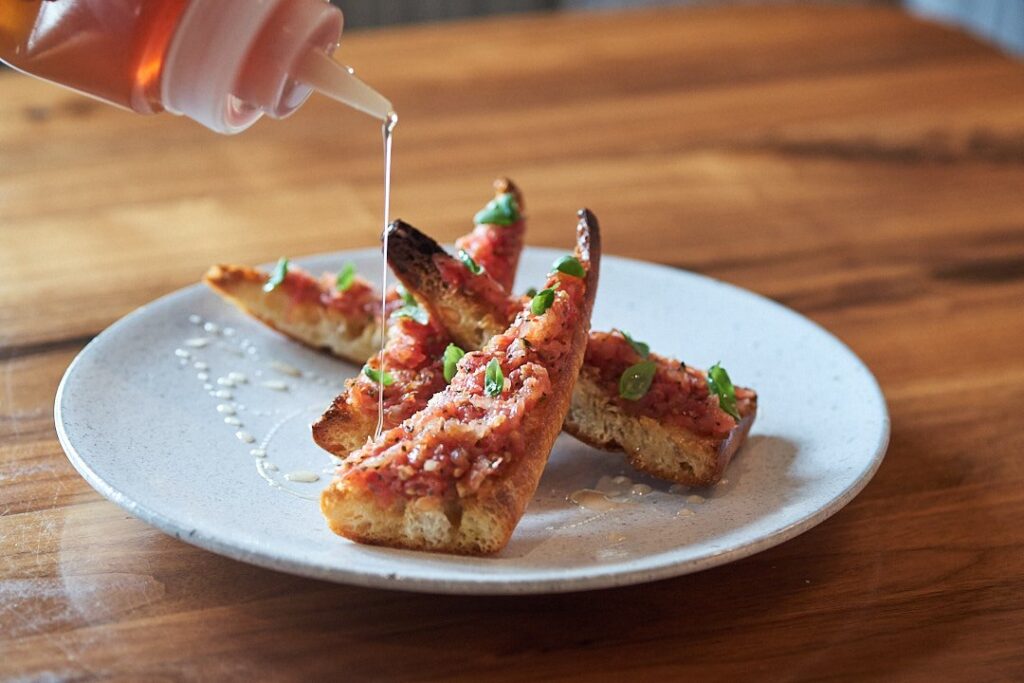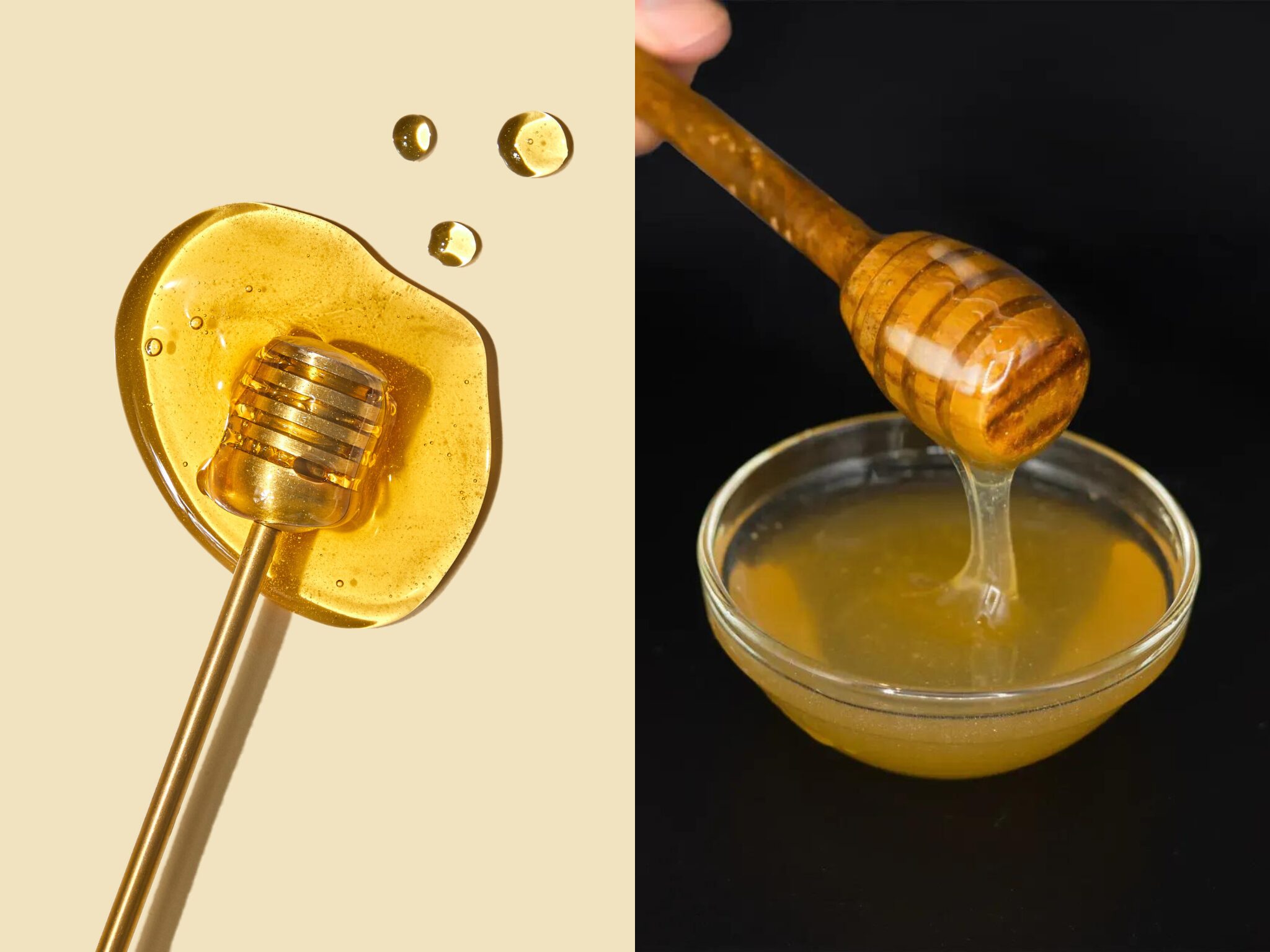Bee-Free Honey: MeliBio Partners with Pow.Bio to Scale Up Precision-Fermented Sweetener with AI
5 Mins Read
One of Fast Company’s Most Innovative Companies for 2024, Californian food tech startup MeliBio has teamed up with Pow.Bio to scale up production of its bee-free honey made from precision fermentation.
After a year of multiple product launches in the vegan honey space, MeliBio now has an update on its original, much-awaited innovation: precision-fermented honey. The Californian company is tapping into the AI capabilities of Berkeley-based biomanufacturing startup Pow.Bio to help scale up production for its bee-free honey.
MeliBio says it has wrapped up key in-house validation work and produced a proof of concept for its fermentation-derived protein targets, which showcases the commercial viability of its high-value bee proteins and enzymes. The startup is set to kick off scale-up projects with Pow.Bio this month, which is a crucial next step in disrupting the $9.1B global honey market.
“Working with cutting-edge science, particularly that aided by precision fermentation, has always been part of our long-term technological vision at MeliBio,” said MeliBio co-founder and chief technology officer Aaron Schaller. “Our ability to produce target bee proteins and enzymes through our experimental methods has yielded promising results, and we’re ready to take our technology to the next stage.”
Tapping into AI to advance bee-free honey

The partnership will allow MeliBio to tap into Pow.Bio’s expertise in blending traditional fermentation with a continuous approach led by AI. “Pow.Bio is helping MeliBio further understand and optimise our precision fermentation approach as we scale towards manufacturing readiness,” Schaller told Green Queen. “Pow.Bio is unique in that their fermentation platform utilises AI to maximize efficiency, which we plan to explore further in our work together.”
MeliBio says the collaboration isn’t all about scale, but also focuses on “precision, efficiency and embracing both AI-enhanced and time-honoured methods”. “This initiative will help us elevate the functionality of our products to come, and provide more of the benefits of bee-derived honey to current products, while also matching authenticity beyond taste and texture,” explained Schaller.
He confirmed that the company is pursuing regulatory filings to the FDA alongside the scale-up work, which will allow MeliBio to eventually launch its precision fermentation product to the market. “MeliBio strives to be a solution provider across multiple channels, and we will meet our customers where they are,” added co-founder and CEO Darko Mandich.
MeliBio has been working on precision-fermented honey ever since it was launched in 2020, and has raised $9.4M in total funding. It’s currently in the middle of a $10M Series A, which will help propel the company towards profitability. The company launched in the market last year with vegan honey under its CPG brand Mellody, and has raked in over $1M in profit in the first year.
The startup is tackling some big challenges facing the production of bee-derived honey. In Europe, 24% of bumblebee species are facing a threat of extinction, while in the UK, 17 species of bees have become extinct, with a further 25 endangered. Beekeepers have reported colony losses in countries like France, Belgium, Germany, Italy, Spain, the Netherlands, Russia, Brazil and the US.
The primary cause behind all this is human activity, including land use change for agriculture or urbanisation, and intensive farming. Moreover, honey bees’ ability to produce the sweetener itself has declined, thanks to widespread herbicide use, conversion of flower-rich land into monocultures, a drop in soil productivity, and climate change.
Precision fermentation sets MeliBio’s honey apart

To accelerate its mission, launching into the market was key for MeliBio, which is why it launched Mellody, even as it continued to work on the precision-fermented product in the background. “We realised that our investors’ samples are becoming more sophisticated, to the point where chefs begged us to launch our plant-based honey,” Mandich told Green Queen in August. “We heard our customers loud and clear, and that’s how our pivot happened. It shortens our initial five to seven years timeline for product launch down to three years, which is great success.”
Mellody’s first product was a Golden Clover honey that was initially rolled out in foodservice across the US, and then through retail via Eleven Madison Home, the e-commerce arm of Daniel Humm’s Michelin-starred eatery Eleven Madison Park. After that partnership ended, Mellody evolved into a D2C brand, and just earlier this month, it released a Spicy Habanero flavour of its plant-based honey at Expo West.
MeliBio also struck a four-year deal worth $10M with Slovenian distributor Narayan Foods to enter the European market, which saw it launch Vegan H*ney under the Better Foodie brand in the UK, and Vegan Hanny or Ohney under Aldi’s private label, Just Veg, in the EU. The partnership’s aim is to put MeliBio’s vegan honey into 75,000 stores eventually.
“MeliBio products in Europe are at price parity with mainstream honeys and we expect to achieve the same in the US this year,” revealed Mandich. “We’ve enjoyed a fantastic market response to our plant-based honey products and will continue to serve that demand.” And it’s not just commercial success – the startup was just recognised as one of Fast Company’s Most Innovative Companies in the small and mighty category for 2024.
“Mellody is our flagship product and brand, and we’re committed to its growth,” he said. “Our products are available through multiple channels including DTC, grocery and retail, food service, and restaurants from casual to fine dining, in a growing number of geographies. We plan to continue to serve existing customers and reach new markets, no matter where they are.”
But now, the precision-fermented progress represents the next step for MeliBio, which will set it apart from competitors in the vegan honey space, such as Gaffney Foods’ Nectar, Blenditup, ChocZero, Plant Based Artisan’s Honea, and Sweet Freedom. “Beyond [the vegan products], accessing levels of product performance and authenticity not possible through plant science alon – through our enhanced technology platform – opens up a variety of significant commercial opportunities,” said Mandich.
He outlined this in his chat with Green Queen in August too: “It will empower us to go beyond the type of product we have right now, and set us [up] for success in launching many new products under the vision of creating the world where humans and bees thrive.”



